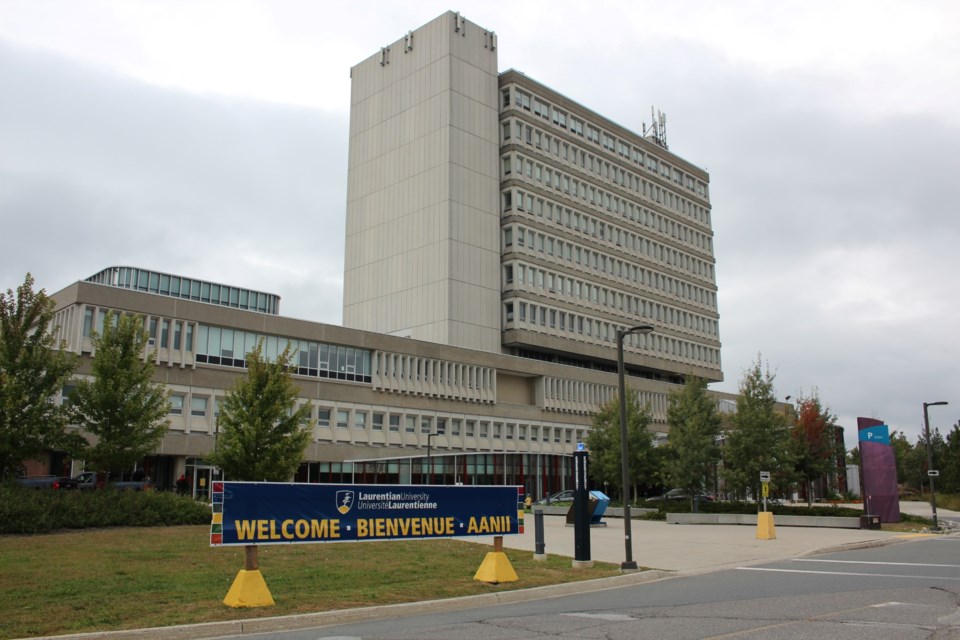Still-strong international student enrolment is propping up Laurentian University’s student numbers this fall, at a time when domestic enrolment has seen a drop following the graduation of its larger pre-insolvency cohorts.
Preliminary numbers show domestic enrolment is down at the Sudbury university three per cent year-over-year.
In a written report presented to the university’s senate Oct. 15, Laurentian president Lynn Wells said while there is an increase in new undergraduate student intakes for both on-campus and online degree programs, there was also a significant decline in returning students.
International enrolment at Laurentian is ahead 12 per cent year-over-year, as a result of the flow-through of returning graduate student enrolment in course-based master’s programs from last year and the spring of 2024.
All told, there is an overall year-over-year stability in Laurentian’s enrolment, with a -0.2 per cent fluctuation.
Looking more closely at the numbers, undergraduate in-person returning students are down by six per cent, graduate in-person returning students are down by 10 per cent, online undergraduate returning students are down by one per cent and online graduate returning students are down by 34 per cent.
The current estimates show a final full-time equivalent (FTE) student count of of 6,301 +/- 150 on Nov. 1, resulting in a shortfall of -120 FTE compared to the overall planned enrolments (-480 domestic FTE and +360 international FTE).
(FTE is a calculation showing how many students would be attending if all were enrolled full time).
In 2020, prior to the CCAA, Laurentian’s FTE student enrolment stood at 7,090. As of the fall of 2022, Laurentian’s FTE enrolment had dropped to 5,729, so the current numbers show enrolment has rebounded somewhat.
During the Oct. 15 meeting, Laurentian senate member Amanda Schweinbenz asked Wells if she knew what was causing the decrease in returning students.
“Thank you, senator, for the question, and it's a question that concerns me greatly as well,” said Wells.
Laurentian provost Malcolm Campbell, who has only been with Laurentian for 10 weeks, said he also found these numbers alarming at first, but added there’s a good explanation.
“It's beautifully explicable in a figure actually, that was provided as part of our budget report last year, which had to do with overall enrolments over the course of the last decade,” he said.
“And if one takes a look at that particular report, what you'll find is that there was a significant increase in enrolments that occurred in 2019, 2020 and then after that, for obvious reasons, a significant decrease in enrolments that we had here at the university.”
(Campbell, presumably, was referring to the massive cuts to programs and employees at the university in 2021 that occurred as a result of Laurentian’s insolvency, resulting in lower enrolments at LU).
“Those students that we enrolled in 2019, 2020 are now graduating, and so one of the reasons that we're not seeing as many returning students is that our students tend not to return after they've graduated, which is not a bad thing,” Campbell said.
He said the numbers haven’t been parsed out, but his “understanding is that amongst the greatest reasons where we're observing a decrease in domestic enrolments right now is because students are graduating from their program as opposed to transferring elsewhere.”
Senate member Albrecht Schulte-Hostedde wondered if some students might be transferring out of Laurentian because of a lack of student services.
“As the parent of two university-age students that are in university right now, I can say that what happens on campus matters, and my understanding is that the student experience surveys have been not been great for Laurentian, and so it just seems that that might be a place to think about at least moving forward in terms of retention,” he said.
“There isn't a lot of data sector wide on why students move from one university to another, save one thing, and that is programs,” Campbell said.
“Programs are the primary reason why students migrate from one institution to another, that the fit of the program is misaligned, or is not fulfilling the needs or desires of that particular student. So that, I think, should be our primary focus.
“But it's not to say that looking at other amenities shouldn't also be important with regards to thinking about how we retain students at our university. But first and foremost, and the thing that we have the greatest control over is the quality and delivery of our programs.”
Last winter, the federal government curtailed international student study applications, but Laurentian is still faring well in this area, although there are potentially stormy waters ahead for the university sector.
The university already made a big push to increase its international student levels, having increased their numbers by 154 per cent a year ago, and graduate students were not included in new caps on international student permits.
However, the federal government has now included master’s and doctoral students in study permit intake caps for 2025.
“We're all watching with interest and concern the developments around international student enrolment with a further decrease in the cap and in our context, most importantly now, the inclusion of graduate students in the international student caps as well,” said Wells.
“So we're working through the implications of this. I know the Council of Ontario Universities is studying this very hard.
“There are implications beyond the pure numbers, just in terms of Canada's brand in the world, and people's impression of how accessible Canada is as a destination for university students, but rest assured, we're thinking about it very carefully and doing as much analysis as we can in a world of constant change.”
Heidi Ulrichsen is Sudbury.com’s assistant editor. She also covers education and the arts scene.




